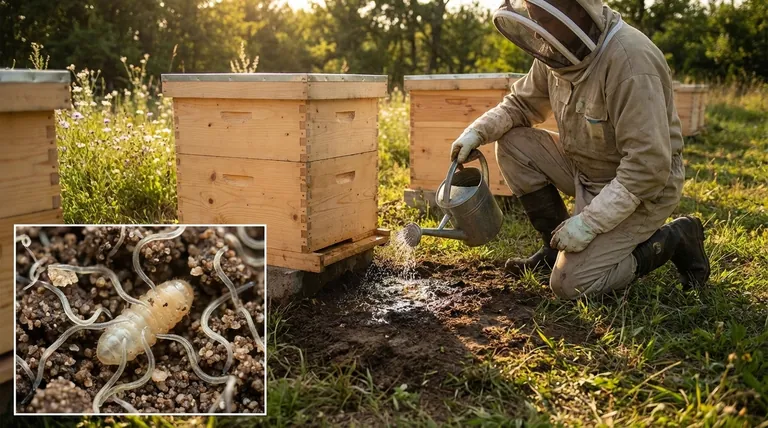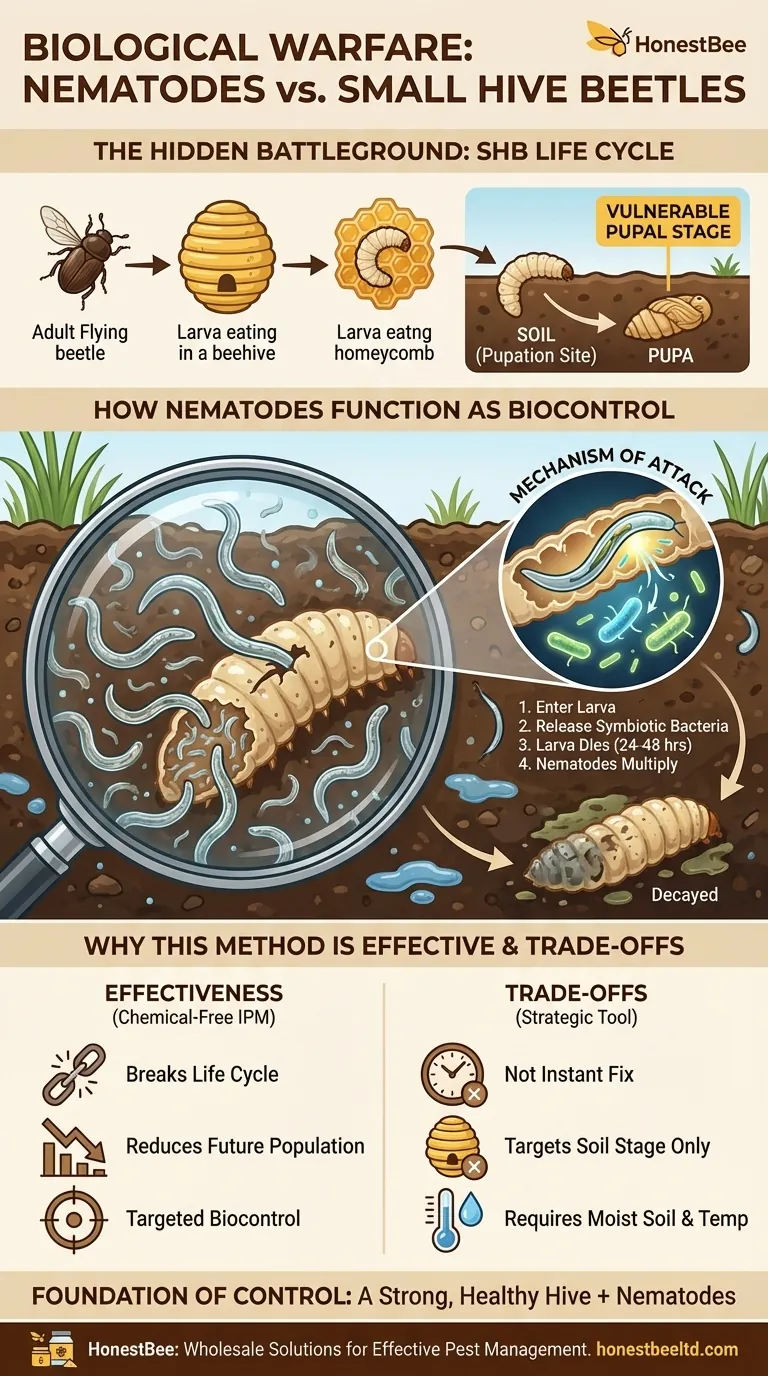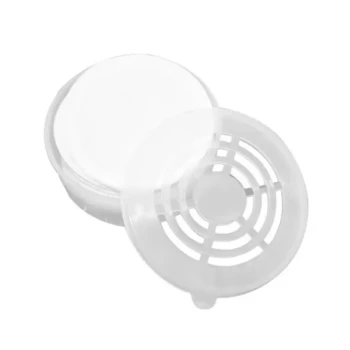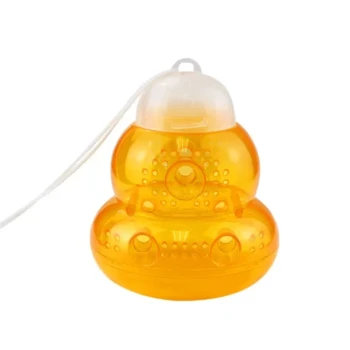In the battle against small hive beetles, beneficial nematodes act as a targeted, biological weapon. These microscopic worms live in the soil and actively hunt down small hive beetle larvae after they have exited the hive to pupate. By killing the larvae in the ground, nematodes break the beetle's life cycle before they can mature into adults and re-infest your colonies.
The core strategy for controlling small hive beetles is not just about what happens inside the hive, but also what happens in the soil around it. Nematodes offer a powerful, chemical-free way to disrupt the beetle's reproductive cycle at its most vulnerable stage.

The Hidden Battleground: The Beetle Life Cycle
To understand why nematodes are effective, you must first understand the enemy's life cycle. The fight against the small hive beetle (SHB) extends beyond the hive walls.
The Adult Beetle Invasion
Adult beetles enter a hive, primarily seeking to lay their eggs. Strong colonies can often manage a small number of adult beetles by trapping them in "jails" of propolis.
The Larval Stage
Once the eggs hatch, the destructive larval stage begins. SHB larvae consume bee brood, pollen, and honey, often causing the honey to ferment and spoil.
The Vulnerable Pupal Stage
After gorging themselves, the larvae exit the hive and burrow into the surrounding soil to pupate. This is the critical moment where they are exposed and defenseless, and it is the precise window where nematodes intervene.
How Nematodes Function as Biocontrol Agents
Using nematodes is a form of Integrated Pest Management (IPM) that leverages a natural predator-prey relationship to your advantage.
What Are Beneficial Nematodes?
Beneficial nematodes are microscopic, naturally occurring roundworms that are harmless to bees, plants, and humans. They are predatory organisms that specifically target soil-dwelling pests.
The Mechanism of Attack
Nematodes actively hunt for SHB larvae in the soil. Upon finding a larva, the nematode enters its body and releases a symbiotic bacterium.
This bacterium swiftly multiplies, killing the beetle larva within 24-48 hours. The nematodes then feed on the bacteria and the liquefied remains of the larva, reproducing inside the dead host before emerging to find new prey.
Why This Method is Effective
This is a natural, chemical-free approach that reduces the need for harsh treatments in or around your apiary. It targets the beetle population at its source, decreasing the number of new adults emerging to challenge your hives.
Understanding the Trade-offs
While highly effective, nematodes are a strategic tool, not a magic bullet. Understanding their limitations is key to successful implementation.
Nematodes Are Not an Instant Fix
They work to reduce beetle populations over time. You will not see an immediate disappearance of beetles inside the hive, as this method only targets the next generation.
They Target Only One Life Stage
Nematodes in the soil have absolutely no effect on the adult beetles or larvae already inside your hive. In-hive management is still necessary.
Application and Environment Matter
Nematodes are living organisms. They must be applied to moist soil and within a specific temperature range to survive and be effective. Applying them to dry, hot ground will render them useless.
The Foundation of Control: A Strong, Healthy Hive
The most effective tool against the small hive beetle is the honey bee itself. Nematodes are a powerful supplement to, not a replacement for, strong colony management.
The Bees' Natural Defenses
A populous, healthy colony is the best defense. Worker bees will actively harass, chase, and imprison adult beetles in propolis jails, preventing them from laying eggs.
Why a Weak Hive is a Target
A small or struggling colony lacks the workforce needed to police the hive effectively. This allows beetles to run rampant, lay eggs freely, and quickly overwhelm the bees.
Making the Right Choice for Your Apiary
Your approach should be tailored to your specific goals and the current state of your hives.
- If your primary focus is immediate, in-hive beetle control: Focus on strengthening your colony, reducing entrance size, and using appropriate in-hive traps to manage the existing adult population.
- If your primary focus is long-term, sustainable population reduction: Apply beneficial nematodes to the soil around your hives in the spring and fall to break the beetle life cycle and reduce future pressure.
- If your primary focus is a holistic, chemical-free strategy: Combine vigorous hive management with regular soil treatment using nematodes for a comprehensive defense.
Ultimately, managing small hive beetles effectively means fighting them both inside the hive with strong bees and outside the hive with powerful allies like nematodes.
Summary Table:
| Aspect | Key Insight |
|---|---|
| Target | SHB larvae in the soil (pupal stage) |
| Mechanism | Nematodes enter larvae, release bacteria, kill within 24-48 hours |
| Effectiveness | Breaks beetle life cycle; reduces future adult population |
| Limitations | Does not affect adult beetles or larvae inside the hive |
| Best Use | Part of an Integrated Pest Management (IPM) strategy |
Ready to strengthen your apiary's defense against small hive beetles?
As HONESTBEE, we supply commercial apiaries and beekeeping equipment distributors with the wholesale-focused solutions needed for effective pest management. Let us help you integrate nematodes and other IPM tools into your operation. Contact us today to discuss how our beekeeping supplies can protect your hives and support your success.
Visual Guide

Related Products
- Wholesales Dadant Size Wooden Bee Hives for Beekeeping
- Professional Multi-Function Stainless Steel Hive Tool
- Compact Circular Bee Mite Treatment Dispenser
- Gourd Shaped Hanging Wasp Trap Professional Wasp Catcher
- Galvanized Beekeeping Smoker for Honey Bee and Apiculture
People Also Ask
- What is the primary function of regular beehive cleaning? Protect Your Colony with Expert Hygiene & Bio-Security
- Which honey bee diseases cause sunken, perforated, or discolored brood cappings? Identify Foulbrood & Chalkbrood
- Why is the rotation of pest treatments essential in a honey bee colony? Prevent Resistance and Protect Hive Health
- What tools and devices are used to protect honey bee colonies? 5 Effective Ways to Deter Wasps and Birds
- How do natural plant-based formulations protect beekeeping equipment? Natural Wax Moth Defense with Walnut and Nettle
- What are the primary advantages of using rapid Diagnostic Test Kits for American Foulbrood (AFB)? Save Your Apiary Now
- What roles do screened bottom boards play in the management of honeybee colonies? Optimize Cooling and Pest Control
- How do specialized medication tools prevent the disruption of honey bee microecology? Protect Your Colony's Gut Health



















